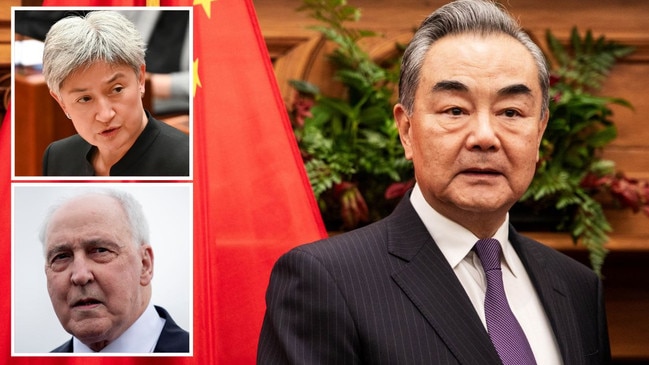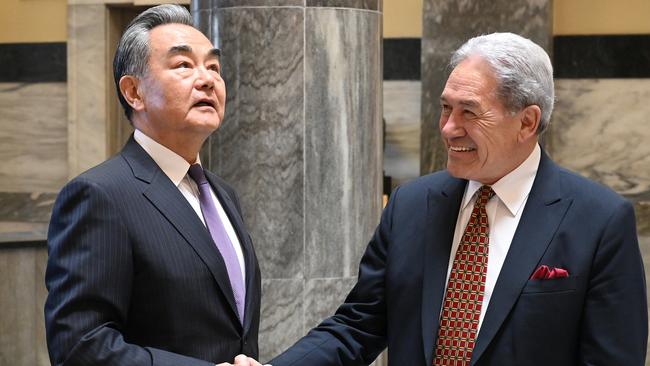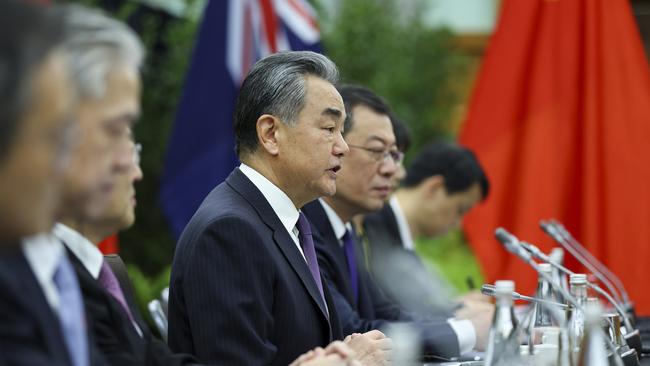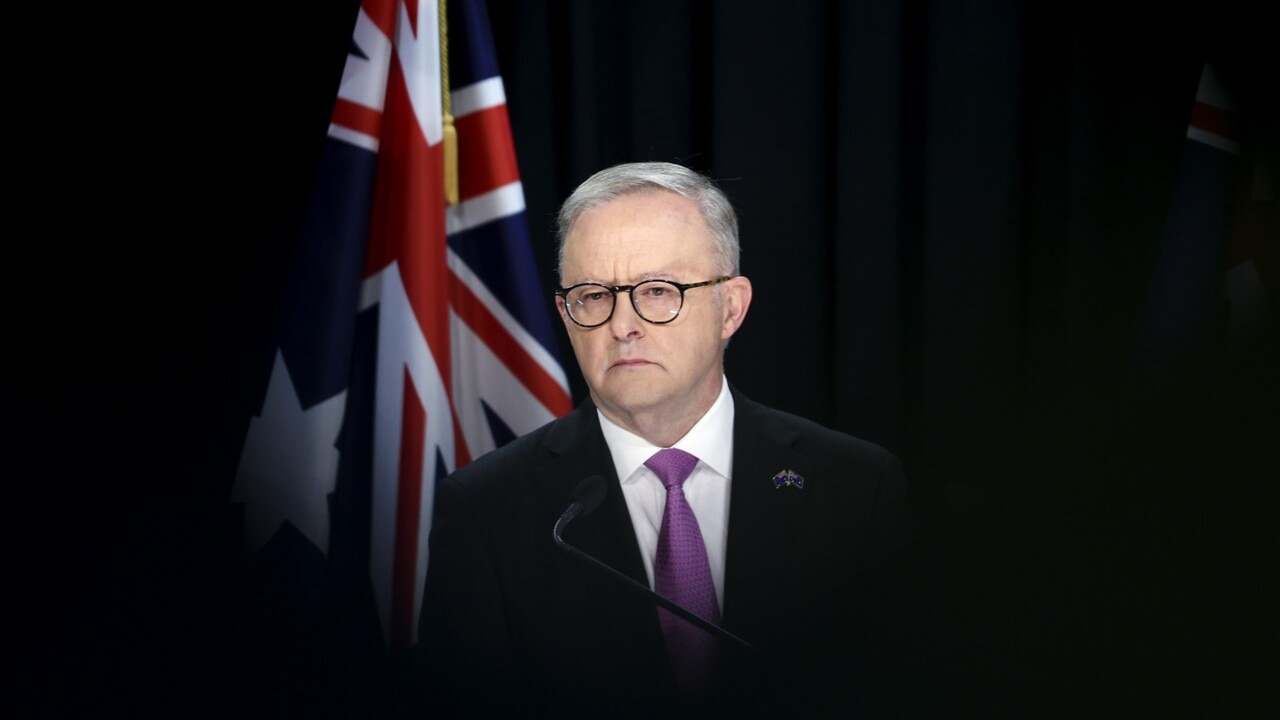Penny Wong downplays Paul Keating’s influence ahead of meeting with Chinese envoy Wang Yi
Penny Wong has sent a clear message to China ahead of Wang Yi’s meeting with Paul Keating, with details of the envoy’s plans while in Australia revealed.

Penny Wong has sent a clear message to China that Paul Keating has no influence over government policy ahead of Chinese Foreign Minister Wang Yi’s meeting with the pro-Beijing former prime minister.
In her first comment on Mr Wang’s scheduled audience with Mr Keating on Thursday, Senator Wong told The Australian: “Mr Keating is entitled to his views. He does not speak for the government nor the country.”
The pointed remark follows Mr Keating’s repeated criticism of Senator Wong’s performance as Foreign Minister, and the government’s ongoing warnings over China’s destabilising influence in the region.
Mr Wang will sidestep public scrutiny during his visit to Australia, refusing to appear at a press conference in Canberra with Senator Wong amid ongoing tensions between the nations over a raft of sensitive issues.
In bilateral talks on Wednesday, Senator Wong is expected to raise China’s aggressive behaviour in the South China Sea and express concerns over Beijing’s suspended death sentence for Australian writer Yang Hengjun.
She is also expected to raise China’s poor human rights record, and its remaining trade bans on Australian exports.
Senator Wong invited Mr Wang to attend a joint press conference with her after their closed-door meeting, but he declined. She will front the media alone, offering questions to both Australian and Chinese journalists in a show of transparency.
Senator Wong’s move to downplay Mr Keating’s influence came as Climate Change Minister and Keating confidant Chris Bowen declared the 80-year-old former Labor leader was a “deeply respected” figure across Asia.
“It is entirely usual for a visiting Foreign Minister to seek out a former prime minister, particularly one who played the role he did in Australia finding security in Asia, not from Asia, as Paul Keating did all those years ago,” Mr Bowen told the ABC.
But opposition foreign affairs spokesman Simon Birmingham, who will also meet with Mr Wang on Wednesday, said Mr Keating’s interventions were “reckless and irresponsible”, and had been “clearly welcomed for propaganda purposes elsewhere”.
“I think, frankly, Paul Keating should reconsider his undertaking of this meeting,” Senator Birmingham said.
“I note he’s dialled back some of his usually quite out-there and extreme rhetoric. But in the end, all of our former prime ministers do have a responsibility to be judicious in the use of their offices.”

Mr Wang flew into Sydney late on Tuesday after a stop in New Zealand, where he warned counterpart Winston Peters against joining the AUKUS security pact.
Mr Peters pushed back, telling Mr Wang that concerns over Chinese security threats were not “imaginary”, and New Zealand would choose its own security arrangements.
“It was just a matter of making it very certain that he understood that we did not have imaginary concerns about long-term security,” he told journalists after the meeting.

Mr Wang will fly from Sydney to Canberra for his official program, then head back to Sydney for his meeting with Mr Keating and an event with Chinese community members on Thursday.
Hundreds of human rights protesters are expected to rally on the lawn outside Parliament House in Canberra as Mr Wang meets with Senator Wong, and later Anthony Albanese.
UTS Associate Professor Feng Chongyi – a close friend of Dr Yang – said Labor had over the past two years “prioritised trade with China at the expense of other principles”.
“Since 2017, 2018, Australia had been in the forefront of the democratic world’s pushback against Chinese political interference, interference, ideological infiltration and espionage,” Dr Feng said.
“And now that momentum has been lost by the Labor administration. When they gave up this agenda, it was actually an act of capital capitulation.”
Dr Feng, who will be among the protesters, said Dr Yang had received two consular visits since his death sentence in February. He said his friend’s health had stabilised, but his kidney condition had not been addressed, and he remained in the custody of China’s Ministry of State Security, rather than in a mainstream facility as would be expected after sentencing.
He said Chinese authorities also continued to deny Dr Yang’s wife an exit permit so she could come to Australia.
On Mr Wang’s 2017 visit to Australia – the last by a senior Chinese official – he joined then foreign minister Julie Bishop for a joint press conference, taking questions on China’s disputed claims in the South China Sea and the prospect of a war with the US.
A year earlier in Canada, he berated a journalist for questioning China’s human rights record and destabilising maritime behaviour. “You have no right to speak on this,” Mr Wang said, to the disbelief of his Canadian hosts.

Lowy Institute senior fellow Richard McGregor said Mr Wang’s overseas press conferences had become more infrequent in recent years. “That’s really in keeping with the times, in which the Chinese government is less and less willing to engage with the Western media,” he said.
Ahead of Mr Wang’s visit, Beijing signalled that its crippling tariffs on Australian wine would be lifted by the end of March. That should see local winemakers reclaim around $500m of the once $1.2bn annual trade with China.
Some Australian lobster industry figures are hopeful for an end to their almost four-year black-listing by China. But others expect a breakthrough in the resumption of the lobster live trade will be held back as a scene-setter for a trip to Australia by Premier Li Qiang, expected in June or July.
A Department of Foreign Affairs and Trade spokeswoman said the government continued to “press for the resolution of the impediments” that had decimated the once $600m live lobster trade.
“The Australian government, including at the highest levels, has consistently advocated for the full resumption of unimpeded Australian exports to China,” the spokeswoman said.
In another closed-door engagement near Parliament House on Wednesday, Mr Wang will meet a select group of Australian business figures, including executives from iron ore giant Rio Tinto and hearing aid maker Cochlear.
Chinese officials moved the meeting at late notice from Sydney to Canberra to accommodate Mr Wang’s audience with Mr Keating on Thursday.
Australia China Business Council national president David Olsson said the 45-minute roundtable was an opportunity to hear from one of China’s most senior government officials about how Beijing views its relationship with Australia “beyond stabilisation”.
“It also enables the Australian business community to share their perspectives and insights on the future direction of the relationship,” Mr Olsson said.







To join the conversation, please log in. Don't have an account? Register
Join the conversation, you are commenting as Logout